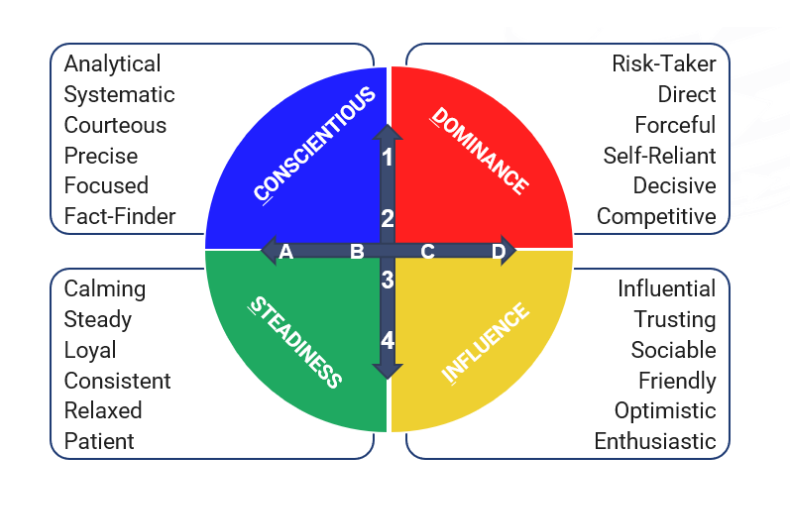In today’s dynamic work environments, understanding behavior is crucial for building effective teams, improving communication, and optimising leadership. One of the most widely used tools for behavioral profiling is the DISC assessment, a system rooted in the research of Dr. William Moulton Marston. DISC is designed to help individuals and organisations gain insight into the predictable aspects of communication, making it an invaluable resource for various business applications.
What is DISC?
DISC is a simple, practical, easy to remember and universally applicable model. It focuses on individual patterns of external, observable behaviours.
- DISC is: needs-motivated, observable behaviour and emotion. It is a combination of nature (inherent) and nurture (learned).
- DISC is NOT: a measure of intelligence, skills, education or experience, or an indicator of values.
It is not a test. You cannot pass or fail. DISC stands for four primary behavioral traits: Dominance, Influence, Steadiness, and Conscientiousness. Each trait represents a distinct aspect of human behavior, and together, they provide a comprehensive profile that explains how people are likely to act in different situations. Here’s a brief overview of each dimension:
- Dominance (D): Individuals who score high in Dominance are often assertive, confident, and driven. They are motivated by results, thrive on competition, and are comfortable taking charge. In a workplace setting, they are the ones who push for progress and are not afraid to take risks to achieve their goals.
- Influence (I): People with a high Influence score are typically outgoing, persuasive, and enthusiastic. They are motivated by social recognition and enjoy building relationships. In a team, they are the connectors, fostering collaboration and ensuring that everyone is on board with the plan.
- Steadiness (S): Those who score high in Steadiness are calm, reliable, and supportive. They prefer stable environments and are motivated by security and teamwork. These individuals are the anchors of a team, providing consistency and a strong sense of loyalty.
- Conscientiousness (C): Individuals with high Conscientiousness are detail-oriented, analytical, and disciplined. They value accuracy and precision, and are motivated by quality and standards. In the workplace, they are the ones who ensure that projects are completed with the highest level of excellence.
Applications of DISC in the Workplace
The DISC assessment is not just a tool for self-awareness; it has practical applications across various business functions:
- Hiring & Selection: DISC helps employers identify candidates whose behavioral profiles match the requirements of the job. This alignment reduces the risk of hiring mismatches, which can be costly in terms of training, benefits, and turnover.
- Team Building: By understanding the DISC profiles of team members, organisations can create more balanced teams. DISC helps identify which traits complement each other, enabling the formation of high-performing teams that mesh well together.
- Leadership Development: DISC is an essential tool for leadership training. It helps managers understand their natural leadership style and how to adapt it to the needs of their team. This adaptability leads to more effective leadership and improved employee performance.
- Communication Management: DISC enhances communication by helping individuals understand the behavioral styles of others. This insight allows for better interaction and reduces misunderstandings, leading to a more harmonious and productive work environment.
- Sales Training: In sales, understanding a customer’s DISC profile can be a game-changer. By aligning their selling style with the customer’s buying style, sales professionals can increase their success rates and build stronger client relationships.
The Importance of DISC in Business
The value of DISC lies in its ability to provide clarity and understanding in human interactions. Whether it’s improving team dynamics, enhancing leadership, or refining communication strategies, DISC is a versatile tool that can significantly impact organisational success. By leveraging DISC, companies can ensure that they have the right people in the right roles, leading to a more productive, harmonious, and profitable workplace.
DISC is more than just a behavioral assessment; it’s a strategic tool that empowers organisations to harness the full potential of their human capital. By understanding and applying the insights gained from DISC, businesses can create environments where every individual can thrive.




